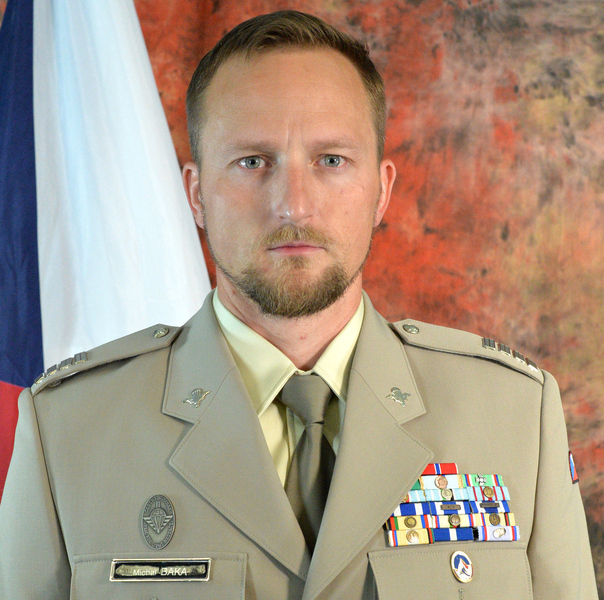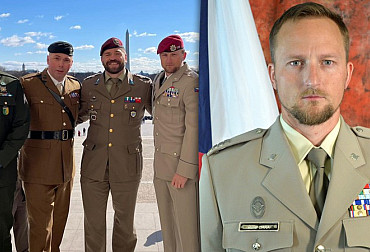A professional among professionals: a Czech soldier's view into the upper echelons of U.S. Army career education (Part 2)
Education is the foundation of everyone's skills and abilities, and being a military professional means a lifetime of working on your knowledge, skills and abilities. If you grew up in the environment of the units of the 4th Brigade, Rapid Deployment "Defense of the Nation" (4th Brn), it makes sense that its motto "where others fall short" becomes part of your DNA and you take the challenge of being sent to the United States Army Sergeants Major Academy (USASMA) to obtain a high quality education as a task where you must not fail. Notwithstanding the fact that we have been sending Army Warrant Officers to this school since 2004, you will find only up to ten graduates of this prestigious school in the current ranks of the Army, and I personally am the third Chief Warrant Officer of the 4th Armoured Division to be given the opportunity to study at this school. In the last installment, I described the so-called pre-course or zero part of the training course and the 1st department of the five that a USASMA graduate must pass. In this article, I will share my experience in the 2nd department - Department of Army Operations.

Department of Army Operations and instructors from the U.S. Army Rangers
Of course, the move to the new department also meant a complete change of class. Of course, your "sponsor" still had your back, but the new team, including the instructors, was actually already a standard at this school, which not only helps you build a network of relationships, but also expands the range of different approaches from the instructors and the school system as a whole. My new instructors were former "Ranger school" instructors, Mr. Shawlinski and SGM Delisle. Their job was to introduce us to the command and control processes, the activities of the various combatant command functions, and to teach us the interrelationship of strategic and operational level planning processes.
A new feature of this department was an oral exam and discussion in an online interface, where each time after studying the materials and study texts, you actually wrote a sort of mini essay of about 500 words in the form of a discussion post on given questions related to the material discussed. The oral exam then focused solely on the decision-making process (MDMP), where one had two days to prepare. The length of the examination, which is conducted entirely in the form of a monologue by the student, was 15 minutes including preparation and was audio and video recorded. The question here was drawn by a rather interesting method - a roll of the dice. The exam contained a total of five questions, so that the number on the die corresponded to the number of the question. If you rolled a six, the choice of the question was up to you. This was the first oral exam in the USASMA course, and it was a unique exam for me, as each department had a different approach to not only learning, but also the methods of examination. There was a cutoff of 72% for all the assessments at the school, and I passed this exam on full marks, without losing a single point.
However, the Department of Military Operations was not only about the oral exam, but also about two seminar papers, focusing on command and control in operations and describing the use and understanding of the just mentioned ADM. The seminar paper on command and control in operations was a very interesting challenge for me, as the task was to analyse the strengths and weaknesses of command and control in the well-known Battle of Mogadishu. Through this term paper, I had the opportunity to speak personally with Mr. Perdue, a former SFOD-Delta operator, better known as Delta Force, who was a direct participant in the fighting in Mogadishu. At the time, Mr. Perdue provided key air support liaison and guided MH-6 Little Bird helicopters to targets in close air support of ground troops, for which he was subsequently awarded the Silver Star. The opportunity to gain a unique perspective from a direct participant in this operation not only provided me with enough information for a term paper, but more importantly, made me realize how crucial the basic skills of a combat soldier are to survival on the battlefield and how this operation has impacted and continues to impact the training and preparation of Delta Force members.
Another interesting but optional part was completing the "Desert Fitness Challenge" which had a total of 15 events. This challenge included a total of 7 hikes ("hikes") in the El Paso area, completing three Crossfit classes, running 90 miles, completing 100 minutes of planks, 90 push ups, and performing 500 push ups (hand release push ups) for a total of 5 weeks.

Combining school with this challenge was challenging, and in the end, I had to work hard to meet the goals, as some of the hikes had to be done right after each other (El Paso is about 1,200 m above sea level and the hills we hiked were even 2,300 m above sea level).

In spite of the time pres I successfully completed everything and our flag flew among the successful conquerors of this challenge. I ended up finishing this semester with a final grade of 95.80% and therefore a pretty good A. It was time to move on to the leadership department, which was, according to many, the hardest department of this school. But that's for another time...






















